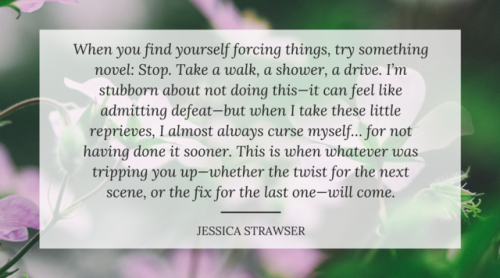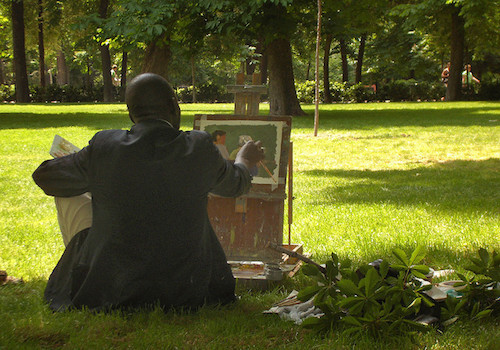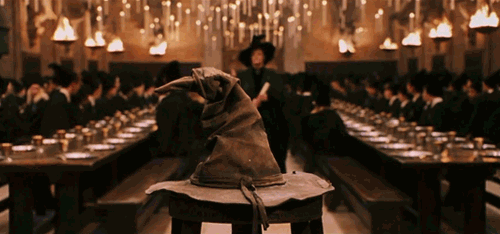Chris Baty's Blog, page 98
July 30, 2018
Giving Up Would Be Easier than Continuing Writing, Right?

Camp NaNoWriMo is almost over! It can be tempting to give up on your writing project if you’re feeling frustrated, but today, Camper Eva Papka reminds you of the reasons you shouldn’t give up:
Maybe this thought has crept into a corner of your mind. After all, at the beginning of your writing quest, those words seemed a surmountable task. And it’s true that you’ve been adventuring for awhile in your Camp NaNoWriMo writing, but now you find yourself weary and filled with doubt. Dreaded responsibility monsters might even be attacking you and calling you away from your writing. Perhaps you find yourself stuck at an impossible plot point, or your characters are really misbehaving from your outline and consequently you’ve toyed with the idea of putting your sword down.
Every writer experiences the battle of grim thoughts, especially when they’re getting closer to striking gold. And it’s easy to forget that in the past month you’ve done the impossible because instead of rejoicing in your words you’ve been measuring your success with the completion of your goals. But, you’ve forged words together and hammered away at your art despite the impossible. You’ve gotten words out before or after your endless daily tasks, and no matter the number of them, you’ve made magic. You’ve accepted your writing journey the way a hopeful new hero takes on a quest: with bravery and determination.
And now a delicious question occurs to you: What would happen if you continued to add more words? What if you continued making your art?
“Every writer experiences the battle of grim thoughts, especially when they’re getting closer to striking gold.”Reality monsters and doubt aside, your art matters! In the past month, you’ve managed to create a new world; or perhaps you’ve been a NaNo rebel and have commenced a revision battle, fighting and tweaking your art in order to make it shine brighter like a polished hero’s sword. Everyone else has gone about with their normal lives, but in your spare time you’ve not only done that, but you’ve also woven a new reality together in the form of your stories.In these last few steps of the hero’s journey, there’s always that desire to give up, and you might even find yourself creatively blocked, but it happens to every writer, whether they’re new to threading stories together or not. And we are all in this together.
There’s a quote out there that’s been tumbling around in my mind: “The moment you are ready to quit is usually the moment right before the miracle happens. Do not give up.”
So, get out there. You are an inspiration hunter, and you are bound to be victorious, regardless of a pesky word count. Perhaps you’ll stumble upon inspiration during a walk or while listening to a new song. Maybe the answer will be hiding in your dreams or will be reignited by reading an exciting book. Turn to those authors that have touched you, or to those friends that are also story tellers, or to your wonderful NaNo community for support in the last leg of the journey.
Your words matter. Your art matters. Every word written is a step closer to that finished product. To a dream made tangible. Regardless of where you are in your goals, do not give up. You are a word warrior, slayer of monsters, creator of worlds and a Camp NaNoWriMo champion.

Eva Papka has as a Bachelor of Arts in Adolescent English Education and a Masters of Science in Education in Adolescent Literacy. Eva drinks lots of coffee and is typically trapped in a day dream. She is a lover of all things cats, fantasy, and YA. She is currently querying a YA fantasy and working on a realistic fiction novel.
She co-hosts a weekly Twitter writing and SFF chat called #Magicmon. You can find her being awkward and gushing about fantasy and writing on her Twitter handle @wordcaffeine.
Top image licensed under Creative Commons from Sarah Scicluna on Flickr.
July 27, 2018
Camp Pep: Nothing is Impossible

Camp NaNoWriMo is nothing without you, our incredible participants. Today, Camp NaNoWriMo participant Erica McNary offers you some advice for this last week of Camp:
You’re exhausted.
You’re frustrated.
The words won’t come.
We’ve all been there.
I’m currently there with you. We start our projects with steely resolve, determination and confidence. Now, the time has come for writer’s block, uncooperative characters, faulty plot lines, and (very much for me) real life responsibilities to get in the way. Between my inordinately large brood of children and the need to keep them not only alive but entertained during the summer, too many volunteer commitments (because I just can’t say no), and the never-ending laundry and food preparation routine that accompanies a large family, writing hundreds of words per day feels impossible.
But I didn’t start writing only to call it impossible halfway through and neither did you. We Campers have words in our heads that are desperate to be written. Words that, no matter how imperfect and chaotic they are at first, are worth the time we spend huddled over keyboards. Amidst the bedlam of daily life, sometimes through the din of kids’ laughter and squabbles—because, summer break—we write.
“That’s what it’s about, Campers: finding the tiny pockets of time to get even a few dozen more words on your screen.“I write in the early morning before the kids wake. I write late at night when the entire house is finally asleep and quiet. I drag my ancient and decrepit iPad 2/keyboard case combo around with me like it’s my sixth—and quietest—child and write on the go, waiting for ballet, hockey, and camp pick-up. Since I’m usually buried under two tons of laundry, I write in between switching out loads and matching innumerous socks because of all the places in the house where the kids could find me, the laundry room is the least likely place for them to look.
That’s what it’s about, Campers: finding the tiny pockets of time to get even a few dozen more words on your screen. It’s late nights and early mornings and self-imposed deadlines that you won’t always meet. Whether your obstacles are large families, job responsibilities or story problems, your mission this month is to work through these things because your words are precious and your project is worth it.
We have goals to reach! Your goal may be upping your word count, revising for querying or character development. Whatever it is, this is not the time to let self-doubt creep in and worry whether your words are good enough. This is the time for your words to be written! Maybe it’s changing your routine, turning off your music, turning on some music, writing early in the morning rather than at night. Whatever it is that helps you power through and find inspiration, go with it.
When all else fails, embrace a change of scenery and hide in your laundry room. You never know where inspiration might strike.

Erica McNary is a former nurse, mom of many, constant preparer of food, and drinker of coffee. After spending the last eleven years exclusively employed by her five children in the area of parenting arts, she became one of the last people on Earth to read Harry Potter. The series reminded her how good reading was for the soul and inspired this crazy idea that the words, thoughts, and characters floating through her head could be organized into something resembling her own book. Erica is currently juggling the chaos of managing the characters of her first novel along with raising a herd of children. You can find Erica on Twitter: @erica_mcnary, and Instagram: ericamcnary.
Top image licensed under Creative Commons from Peppysis on Flickr.
July 26, 2018
20 Questions to Ask Yourself When Worldbuilding

One of the most important parts of writing is grounding your story in a believable setting––not just for fantasy, but any genre. Worldbuilding can help you figure out how your characters fit into the bigger picture, or learn what their motivations are.
Sometimes, it can seem frustrating to spend a lot of time on building an elaborate world for your novel, only to have to cut most of that fascinating history and background in the final draft. But having that knowledge is important to create fully rounded out characters and plot. In fact, the iceberg theory of writing imagines that 80-90% of a story occurs below the surface!
How much do you know about the world of your novel? We’ve come up with 20 important questions to ask yourself when creating the background for your story:
How long has your world existed?How did your world originate? Do the people who inhabit your world have a creation myth, or a scientific explanation for how it came to be?
What are some important historic events in your world? How did they contribute to the geographic or social structures that exist in your world’s present day?
What is considered a curse word in your world? What is considered sacred, and what is considered profane?
What holidays does your world celebrate?
Does your world have a religion? Do the people in your world put their faith in some other sort of power or institution?
If your world has religion, is there one main religion, or many religions? Are the main religions of your world monotheistic or pantheistic?
What resources are in your world? What are the imports/exports? Which resources are rare and valuable, and which are necessary or common?
What is the structure of your world’s government?
What is the geography and climate of your world?
What are the seasons of your world?
What kind of calendar system does your world have? What’s it based on (lunar cycles, a monarch’s rule, etc.)?
What are the distances between important places in your world? Draw a map if you want to!
What is the class or social structure of your world? Where in that structure does your main character fall?
What language(s) do your characters speak? Is language ever a barrier to communication?
What are some details you can use from real-world places that are similar to your world to make it feel more believable?
What does your world smell like?
What are some of the main dishes the people in your world eat?
What are the limitations of power, energy, or magic in your world?
What kinds of objects or ideas are familiar to the people of your world? What kind of objects or ideas are strange or outlandish to them?
If you get overwhelmed looking at the big picture, try building your world from your character’s perspective: first, what does their room look like? Then, what does their house look like? What kind of neighborhood do they live in? How does that neighborhood fit in with the rest of the town or city they inhabit? What part of the country is that city in? Etc.
The most important things to remember about worldbuilding are: (a) creating a larger scope for your world should still be fun for you, and (b) the worldbuilding you do should help deepen a reader’s connection with your character or drive the plot forward.
Top photo by Andrew Neel on Unsplash.
July 25, 2018
“When you find yourself forcing things, try something novel:...

“When you find yourself forcing things, try something novel: Stop. Take a walk, a shower, a drive. I’m stubborn about not doing this—it can feel like admitting defeat—but when I take these little reprieves, I almost always curse myself… for not having done it sooner. This is when whatever was tripping you up—whether the twist for the next scene, or the fix for the last one—will come.”
—Jessica Strawser is editor-at-large at Writer’s Digest, where she was editorial director for nearly a decade. She’s the author of the book club favorites Almost Missed You and Not That I Could Tell, a Book of the Month selection and Barnes & Noble Best New Fiction pick for March 2018 (both St. Martin’s Press). Her third novel, Forget You Know Me, is forthcoming in February 2019. She has written for The New York Times Modern Love, Publishers Weekly and others, and is a popular conference speaker. Connect with her on Twitter at @jessicastrawser and on Facebook @jessicastrawserauthor.
Your Camp Care Package is brought to you by Camp NaNoWriMo. Sign up to receive more Camp Care Packages at campnanowrimo.org.
July 24, 2018
Developing Consistent Themes in Your Novel

How is your writing going, Campers? Are you swept away in the world you’re creating, or struggling to write the next chapter? Today, Camper Candace S. Hughes shares a few words of wisdom about developing overarching themes as you write:
As we move forward in creating our characters and fleshing out the plot, writers must always circle back to ensure that each day’s writing supports the theme and character development. Instead of the reader asking “Where is this going?” we want to ensure that our new additions show a strong relationship to the story you are telling.
In my own writing, which is mostly creative nonfiction, I use the skills I taught in freshman English. I have an opening paragraph ending with a sentence giving the reader a hint about where I am going. Each new paragraph develops and supports this thesis or theme. If I choose to have several paragraphs of description, I tie them back into what would have been a thesis statement in an English composition. Since some writers may not want to associate in any way with freshman English, the point is to simply take the reader into consideration when going off in a new direction.
I enjoyed this month’s PBS and New York Times book club selection Pachinko, and until I was three quarters of the way through the book I was wondering why it was only a finalist for the National Book Award. Then, close to the ending, new subplots were introduced and not tied into the main story, and that part of the character’s behavior and development was unexplained. I checked with my fellow readers and found that, like me, many loved the book but were puzzled about new and unassociated action toward the end of the novel.
“Unity and coherence with good details and well-chosen rising and falling action keep the audience interested in completing the book.”Foreshadowing is a key element that shows why a specific incident is introduced and can help a reader connect different parts of your story. A controlling idea or theme that the reader clearly sees in each new chapter is one of the best ways to revise when the first draft is completed. Unity and coherence with good details and well-chosen rising and falling action keep the audience interested in completing the book and closing the sad thought that an engaging tale has ended.
To keep the writer interested in completing the first draft, I recall the comedic action in the Pulitzer Prize winner Less. Our hero ends up in bed with an injured ankle and in a hotel in a foreign country with few distractions. He has three weeks to work on his novel, and when he returns to the States is reminded by an old friend that he should not be distracted and should complete his book. While in the summer it may be hard to stay with Camp NaNoWriMo, I encourage all of us to continue toward our common goal.

Candace S. Hughes has bachelor’s and master’s degrees in journalism and has done graduate work toward a master of liberal studies degree. Her poetry has been published at The Arizona Republic Poetry Spot and she has had freelance articles published by Smithsonian.com and Arizona publications.
Top image licensed under Creative Commons from Linda on Flickr.
July 23, 2018
"If you can’t picture exactly what comes next in your story, but you do know what happens a little..."
-

Jessica Strawser is editor-at-large at Writer’s Digest, where she was editorial director for nearly a decade. She’s the author of the book club favorites Almost Missed You and Not That I Could Tell, a Book of the Month selection and Barnes & Noble Best New Fiction pick for March 2018 (both St. Martin’s Press). Her third novel, Forget You Know Me, is forthcoming in February 2019. She has written for The New York Times Modern Love, Publishers Weekly and others, and is a popular conference speaker. Connect with her on Twitter at @jessicastrawser and on Facebook @jessicastrawserauthor.
Your Camp Care Package is brought to you by Camp NaNoWriMo. Sign up to receive more Camp Care Packages at campnanowrimo.org.
July 20, 2018
Camp Pep: You Are an Artist

Camp NaNoWriMo is nothing without you, our incredible participants. Today, Camp NaNoWriMo participant Ashley Jean Granillo offers you some advice for this week of Camp:
Dear Writer,
Your story is worth telling, even if the writing hasn’t caught up to the ingenious idea that you’ve been working out on in your mind as you shower away the filth of your day job.
If you’ve forgotten: writing is a process. Currently, you’re probably in the drafting stage. And drafts, especially first drafts, aren’t perfect. They are messy––riddled with grammatical errors and sentences that appear to be in the language of your choosing but sound foreign. This is exactly where your writing is supposed to be. Yes, you are supposed to be writing cliches and flat lines of dialogue because you are only in the beginning stages of unveiling your story’s true potential. Think of yourself as an artist, sketching out the shapes of a landscape. The detail and color will come with patience.
As a college composition professor and author, I’ve seen and experienced failure, and it’s usually as a result of the self-doubt that occurs during the drafting stage. Too often my students, and occasionally my own brain, tell me that the inconsistencies and poorly structured sentences deem us unfit to continue writing––that we are a disgrace to the art of composition. Remember that artist: just because they sketched a mitten in place of hand doesn’t mean they can’t draw fingers. They’re waiting for the right moment.
“You must to be willing to be imperfect to be a writer. As an artist, you must accept that the first line you draw won’t be your straightest.”Love from the Barricade, my debut novel, was written during NaNoWriMo, and its first draft would give you secondhand embarrassment. It had ten identical characters, and a main character who didn’t know what she wanted, and neither did I at the time. But that first draft, however horrible it was, served as a reminder that: having the draft of a novel is a lot better than having an idea for a novel. You can revise a draft, but you cannot revise an idea, because it does not physically exist for you to rework. I couldn’t discover Aijae without sifting through her confusion. You must to be willing to be imperfect to be a writer. As an artist, you must accept that the first line you draw won’t be your straightest. Luckily, there are tools to help you reshape the work, but later.
You’re a writer and an artist even though your novel is not finished. What separates you from so many other people is that they have ideas for stories, but they fail to do what we do everyday, what you do everyday: write.
Writing is not a competition, albeit this challenge may make it appear that way. Art is practice. You are only here because you have one goal, and that’s to complete what you haven’t had the courage or time to do in the past. You aren’t here to outdo someone else, or make your partners, friends, and family members proud. Let them cheer you on, but don’t allow yourself to think that if your word count slips away that you’re letting them down. By being here, getting in those 500, sometimes only even 100 words a day, you are doing the right thing for yourself. You are taking part of something much greater than you could ever imagine. Revel in the journey of discovery.
I had a student who came in every class with the same defeated look, and the same exhausted sentence, “I completed the essay, professor. But it isn’t any good.” My response wasn’t that they’d better get their sh*t together before I failed their work for its disorganization and comma splices. Instead, I told them this:
I am proud of you. You’re just about to surprise yourself with how incredible your story can actually be.
Take care,
Ashley Jean

Ashley Jean Granillo is an English instructor at College of the Canyons. She has her BA and MA in Creative Writing from California State University Northridge. For a time, she was a freelance music journalist, which serves as the inspiration for her debut novel. Her first novel (a NaNoWriMo Winner 2015), Love from the Barricade, debuts in September from Black Rose Writing. Currently, she is on a mini tour along the west coast, following the music of her favorite band.
Top image licensed under Creative Commons from César Astudillo on Flickr.
July 19, 2018
Harry Potter Word Crawl: Year One

For those of you who have never taken a dip into the NaNoWriMo forums, here’s a little taste of what you’re missing! Today, we’re bringing you a Harry Potter-themed word crawl, slightly modified from the original created by NaNoWriMo participant “my little bird”. Can you navigate your first year at Hogwarts and boost your Camp NaNoWriMo word count?
You receive your Hogwarts letter by owl and are completely ecstatic to head out for your first year at Hogwarts. Sprint to 100 words to let out your excitement and energy.
Part 1: Diagon AlleyYou arrive in Diagon Alley and your first stop is Gringotts, wizard bank. Write for ten minutes. The amount of words you write will determine how many Galleons are in your vault.
Less than 150 words: 1 Galleon
150-300 words: 2 Galleons
More than 300 words: 3 Galleons
You step into Ollivander’s wand shop. What kind of wand will choose you? Roll a die and multiply your roll by 100. Sprint to that many words.
100-200 words: Your wand has a core of unicorn hair.
300-400 words: Your wand has a core of dragon heartstring.
500-600 words: Your wand has a core of phoenix feather.
Finally, you’re done shopping! But before you leave, you decide that you want to purchase a pet. Write for 15 minutes as you search for the perfect animal for you. Pick one: owl, cat, or toad. (Bonus galleon for putting that creature in your novel somewhere!)
Part 2: Hogwarts Express
After months of waiting, you’ve arrived on platform 9 ¾ and boarded the Hogwarts Express! Write to the nearest thousand as you settle into your seat and get ready for a long ride. If you need to write more than 500 words for this challenge and choose not to skip this round, take one Galleon. If you skip a round during Part 2, pay 1 Galleon.
Anything off the trolley, dear? Buy some sweets to help get you through the ride! Depending on your candy, find your challenge below!
Bertie Bott’s Every Flavour Beans: Participate in a Fifty Headed Hydra (a.k.a. an attempt to write 500 words in 5 minutes) as you frantically try to get the taste of earwax out of your mouth.
Chocolate Frog: Write for five minutes as you chase down the frog.
Licorice Wand: Sprint to 150 words.
Pumpkin Pasties: Roll a die and multiply by 50. Write that many words.

You arrive at the castle and wait in the hall with the rest of the first years. You notice a boy with messy black hair and glasses talking with a redheaded boy, a girl with bushy hair whispering to the people around her, and a boy with pale… well, everything. Write for ten minutes as you attempt to socialize with the people around you. If you skip a round during Part 3, pay 2 Galleons.
Professor McGonagall escorts you and your peers into the Great Hall for the Sorting. After the Sorting Hat sings its song and several students walk up timidly, your name is called, and you sit yourself down on the stool, worried about what is about to happen. McGonagall places the hat on your head, and you are sorted into your House. Pick from the four Houses—Gryffindor, Hufflepuff, Ravenclaw, and Slytherin.
Gryffindor: Are you brave enough to write ten times your typing speed in 10 minutes?
Hufflepuff: Remain loyal to your word count and write steadily for 45 minutes with no breaks.
Ravenclaw: Calculate how many words it will take for you to write to the nearest 1000, then write them to get there.
Slytherin: You’re an ambitious one, aren’t you? Write 750 words in 30 minutes!
The feast is delicious! Do the Three Digit Challenge as you eat at your House table and talk with those around you, as well as your House ghost. If you are in Hufflepuff, you know your chambers are near the kitchen, so you may save room for later and skip this round for free.
Part 4: Life in the Castle
You’ve settled into your dormitory quite quickly and nicely, and your first couple weeks of class go well. Write for an hour as you grow accustomed to your new classes and all of the magic you’re learning. If you skip a round during Part 4, pay 3 Galleons.
If you write up to 750 words within the hour: Earn 2 Galleons.
If you write between 750—1,250 words within the hour: Earn 3 Galleons.
If you write over 1,250 words within the hour: Earn 4 Galleons.
On your way to Potions, the messy haired boy who you now know is Harry Potter stops and asks you if you know where Professor Binns’ classroom is. Write 200 words in 10 minutes as you try to remember where his classroom is.
If you succeed: Harry hurries to Binns’ classroom and gives you a Galleon as a thank you for your help.
If you fail: You spend so much time trying to help Harry that you are both late to your next class. Write another 200 words as you apologize to Snape and try not to lose any points for your House.
If you are in Slytherin, Snape likes you and lets you skip this round for free.
That night, you get locked out of your common room and Mrs. Norris finds you! You run with Harry, Ron, and Hermione to the third door corridor, and you find a giant three-headed dog! After making it back to your dormitory safely, roll a die, multiply your roll by 100, and write that many words as you try to calm down.
Troll! In the dungeon! You go with Harry and Ron to find Hermione and end up fighting the troll with them. Sprint to 250 words, and try not to get yourself killed. If you are in Gryffindor, you fight the troll bravely and may skip this round for free.
You go down to Hagrid’s hut to have tea with him. When you try his treacle fudge, your teeth get stuck together! Write for fifteen minutes as Hagrid tries to help and Madam Pomfrey magically loosens the cement-like effect the fudge had on your mouth.
Months pass, and it’s Christmas morning! You receive 3 Galleons from your parents, as well as a challenge from the Weasley twins. Write 1000 words in under an hour.
If you succeed: They give you a Galleon.
If you fail: They hit you with snowballs until you’re buried under heavy amounts of snow and make you write 250 more words.
During the Gryffindor vs Slytherin Quidditch game, you get incredibly excited. Roll a die. If even, you’re cheering for Gryffindor; if odd, you’re cheering for Slytherin. Word war for fifteen minutes with someone cheering for the opposite team. If you beat them, you win your bet, and you take 2 of their Galleons. But be careful—if you lose, you give them 2 of your Galleons. A bet’s a bet.
Part 5: Through the Trapdoor
Harry tells you that he suspects that Snape is going after the Philosopher’s Stone and you decide to go with the trio to try to get to the Stone before Snape does. But before you can even go down the trapdoor, you need to make it past Fluffy. Write for ten minutes as you lull him to sleep sneak through the door. If you are in Ravenclaw, you know exactly how to keep Fluffy asleep and may skip this round for free. If you skip a round during Part 5, pay 4 Galleons.
Oh no—you and your friends are trapped in a patch of Devil’s Snare! Hermione tells you that you need to write 300 words in five minutes in order to safely escape.
If you succeed: You make it out of the deadly plant without a scratch and even spot a Galleon on the ground. What luck!
If you fail: Hermione has to set the plant on fire to get you out alive. She thinks very poorly of your skills now, so write another 300 words to impress her.
Harry catches a flying key and opens a large wooden door. Inside the next room is a giant wizard chess set. You and your friends need to replace some of the pieces and play the game. Ron takes the place of a knight, Harry becomes a bishop, and Hermione takes over for a rook. Pick a chess piece and complete the challenge below! Keep in mind that you are not allowed to skip this round even if you have enough Galleons to do so.
Pawn: You know you won’t be of much use to the game and think it would be wisest to be taken out early. Complete a Fifty Headed Hydra and take a fifteen minute writing break to recover from your injuries.
Rook: You take the place of the other rook and spend the game running across the board, strategically taking out important pieces of the other side’s team. Sprint to 200 and take a five minute writing break once the game is won.
Bishop: You take the place of the other bishop and sneakily take out pawns on the other team. Write for 20 minutes and take a five minute writing break once the game is won.
Knight: You take the place of the other knight and become the wild card of the match. Write 300 words in 15 minutes until you’re taken out by one of the other team’s rooks. Take a fifteen minute writing break to recover from your injuries.
Harry and Hermione move ahead into the next room while you stay with Ron. When Hermione comes back, sprint to 500 words as you run to find Dumbledore and explain the situation to him.

The word gets out that Professor Quirrell is the one who wanted the stone, not Snape! Rumors also spread of your bravery in helping Harry, Ron, and Hermione as you four went through the challenges the professors set to protect the stone. Dumbledore awards you fifty points for your courage. Write for five minutes as your peers congratulate and admire you.
Summer vacation is here! Take an hour-long writing break—you deserve it!
This word sprint originally appeared in the Extreme Harry Potter Crawl: Year One forum by NaNoWriMo user “my little bird”. For more writing games, check out our Word Wars, Prompts, and Crawls forum.
July 18, 2018
“There is no ‘right’ way to write. Do whatever feels best for...

“There is no ‘right’ way to write. Do whatever feels best for you. Try working on whatever section you’re most excited about at the moment—I’ve found that it leads to my best writing.”
—Gloria Chao is an MIT grad turned dentist turned writer. She currently lives in Chicago with her ever-supportive husband, for whom she became a nine-hole golfer (sometimes seven). She was once a black belt in kung-fu and a competitive dancer, but that side of her was drilled and suctioned out. American Panda is her debut novel, and Misaligned is forthcoming fall 2019. Visit her tea-and-book-filled world at gloriachao.wordpress.com and find her on Twitter and Instagram @gloriacchao.
Your Camp Care Package is brought to you by Camp NaNoWriMo. Sign up to receive more Camp Care Packages at campnanowrimo.org.
Text added over original image by Patrick Fore on Unsplash.
July 17, 2018
Don’t Let Your Writing Goals Become Barriers

How are your Camp NaNoWriMo projects going, writers? Are you on par with your goal, blasting ahead, or feel like you’re lagging behind? Today, Camper Shay Duchaine shares a few words of wisdom about the importance of having your goals help rather than hinder you:
It’s that time of year, folks, and we have found ourselves in the middle of another Camp NaNoWriMo season. Some of us are already deeply involved in our projects, while some (like me) are getting a little bit of a late start. Regardless of where you stand, be proud that you have decided to embark on this wonderful adventure.
When a new NaNo session starts, or when I am working on a new project, I like to set personal goals for myself so that I can monitor my progress. I love feeling that sense of triumph when I hit a word count or hear the ding of my alarm after writing for an uninterrupted amount of time. However, I’ve noticed that sometimes when I’m trying to achieve large accomplishments, I can turn personal goals into expectations. When these expectations have gone unmet, for any reason, it can be easy to become self-critical.
As authors, we all have moments of being hard on ourselves. It makes sense, especially when the writing we produce is so personal and highly valued. But what happens when unmet goals start becoming personal barriers between us and our effectiveness in the execution of our pieces? What has started as a method of trying to achieve our best can halt creativity and progress.
Sometimes we can fall into what is an ‘I should have’ complex. I have heard the phrases all too many times, “I should have been able to meet my wordcount,” or “I could’ve gotten a lot more done than I did.” I’ve fallen victim to this sort of mentality more times than I can remember. When sitting down for a writing session starts becoming associated with anxiety, it can negatively affect our motivation. Working on rewriting our inner narrative can assist us in thriving as authors, unrestricted from the negativity which has held us back.
“What happens when unmet goals start becoming personal barriers between us and our effectiveness in the execution of our pieces? What has started as a method of trying to achieve our best can halt creativity and progress.”Imagine how large the boost of self-confidence can be if we make the conscious effort to replace negative statements with what we have been able to accomplish, rather than what we haven’t? Saying “look at how many words that I have been able to get down today,” or noting, “I made the time to sit down and work on my project,” are ways to highlight tasks we can genuinely be excited about! It may seem unnatural to consciously replace the old statements with the new, but with time and practice, this will start to become the norm. You deserve to feel like the amazing author that you are!
For me, trying different writing exercises helps when I am struggling with my work. If you are having trouble deciding where your story should go next, or are trying to connect with your characters more, take some time to visit @NaNoWordSprints on Twitter and work through some of their unique prompts. I have been able to create some great, unexpected material for my novel by taking part in these sprints and by watching the virtual write-in sessions that are hosted on YouTube.
NaNoWriMo has been an extremely fun and positive experience for so many of us who partake in the challenge. Never lose sight of the reason why you are participating! You are not alone in this process. Feel free to reach out to other writers who are participating, especially the members of your assigned cabin. Don’t forget about the other members of your support system; I’m sure they would love to give you encouragement. Good luck with the remainder of this session, I know you are going to do fantastic things during Camp NaNoWriMo!

Shay Duchaine is a writer and Massachusetts native. Her work primarily consists of fiction and poetry. When she isn’t playing video games or reading a good book, she often frequents local coffee shops and cafes. She is an alumna of Bridgewater State University, where she majored in English with a writing studies concentration, and Psychology. Follow her on Twitter or check out her website.
Top image licensed under Creative Commons from VTDarkStar on Flickr.
Chris Baty's Blog
- Chris Baty's profile
- 63 followers



